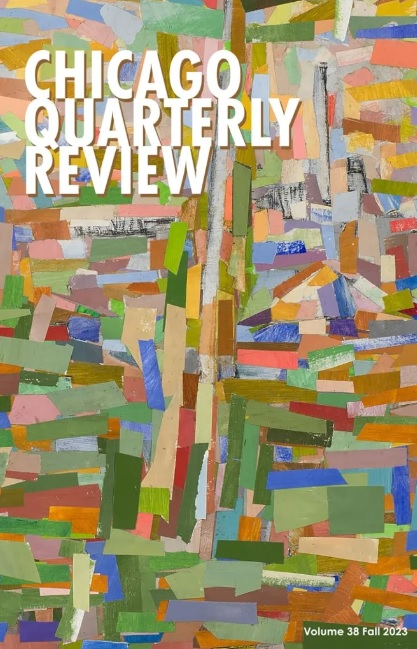When a work of nonfiction starts with a quote from Friedrich Nietzsche, one must understand there will be truth told. In this particular piece, the author’s first line is, “Madness accompanies the creation of art.” Prepare yourself for truth and John Robinson, an incredibly successful writer in the literary journal world, meditates on the madness of the creation of art which he explains, “has led to suicide over the centuries.” But this is a work by John Robinson and years ago he made a shift in his life to uncover truth with beautiful writing and oftentimes delightfully funny, laugh-out-loud scenes. We are in good hands when reading his work.

Cover of Fall 2023 Chicago Quarterly Review
His latest piece appears in the Fall 2023 edition of Chicago Quarterly Review. The CQR is a nonprofit literary journal publishing fiction and nonfiction short stories, poems, and translations. Works they have published have been chosen for “Best American Short Stories, Best American Essay, The O. Henry Prize Stories, and the Pushcart Prize Anthology.” John’s work is in good company.
John begins this reminiscence at a time in his life when still young and determined to write his first novel, he needed to be surrounded by the ghosts and spirits of famous Edinburgh writers such as Robert Louis Stevenson, Sir Arthur Conan Doyle, Dame Muriel Spark, and JM Barrie and he made his way there at twenty-six. Sherlock Holmes could have easily sussed the idea was as leaky as a worn and rusty boat. One night he finds himself walking down “cobblestone streets like a zombie pursued by a Babel of voices.”
In a small corner bookstore, he sought out a work of a real published author that would inspire him. The inspiration came to him in the form of a small novel, just 160 pages, and a “bleak cover showing a darkened city street,” that mirrored the one he had just walked. What caught his attention wasn’t the prose on the first page, but the dedication page. Instead of the usual list of thanks and appreciation, he found a letter to the author’s daughter. He wrote her saying, “This is all I know of the world and will ever know.” A father confessing that he was limited in knowledge but saying to her that she was so loved he needed to give her what he felt was a gift of understanding. John writes, “For the time being, this book contained all he possessed as his legacy to her, and he hoped it would be – along with her natural gifts – all she required to live a worthwhile life.”
What a treasure this was that John found a deeply personal message that when read stopped all the noises in his head, all the doubts he shouldered, and expressed such truthfulness in its words.
There is an amazing world of writers out there and inside us as well and their gift is words, songs, poems, thank you notes, recipes, love letters, and written regrets that no matter how the world is spinning, we can find something akin to that still small voice we should pay attention to.
John shared the lesson he took from that night. He wrote, “Rather like the father who bequeathed his novel to his daughter, a writer can leave behind his writings, which, whether published or unpublished, contain his singular view of the world and existence – an engaging road map and biography of how he felt about himself and the world in which he lived.”
Put your thoughts down and leave your legacy to loved ones and beyond. Write.

Beverly Stoddart is a writer, author, and speaker. After 42 years of working at newspapers, she retired to write books. She is on the Board of Trustees of the New Hampshire Writers’ Project and is the author of Stories from the Rolodex, mini-memoirs of journalists from the 1960s, 1970s, and 1980s.





